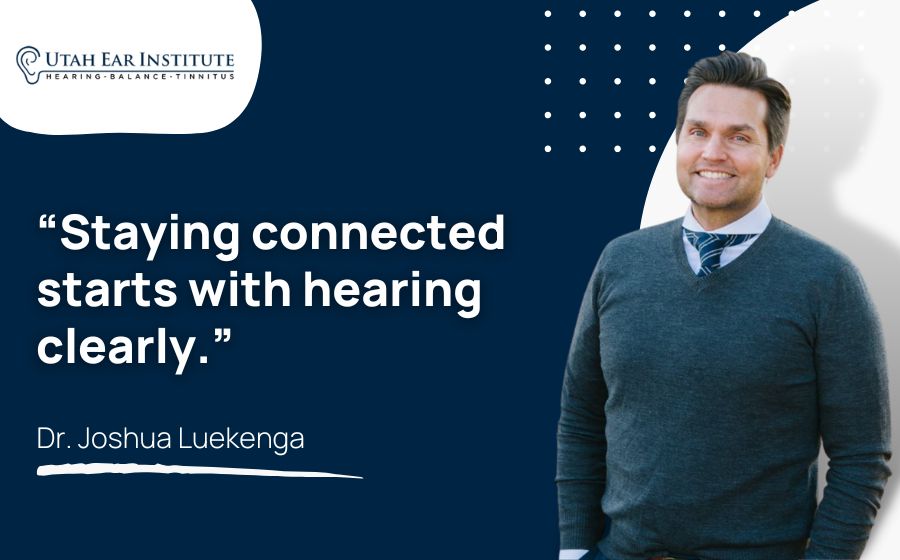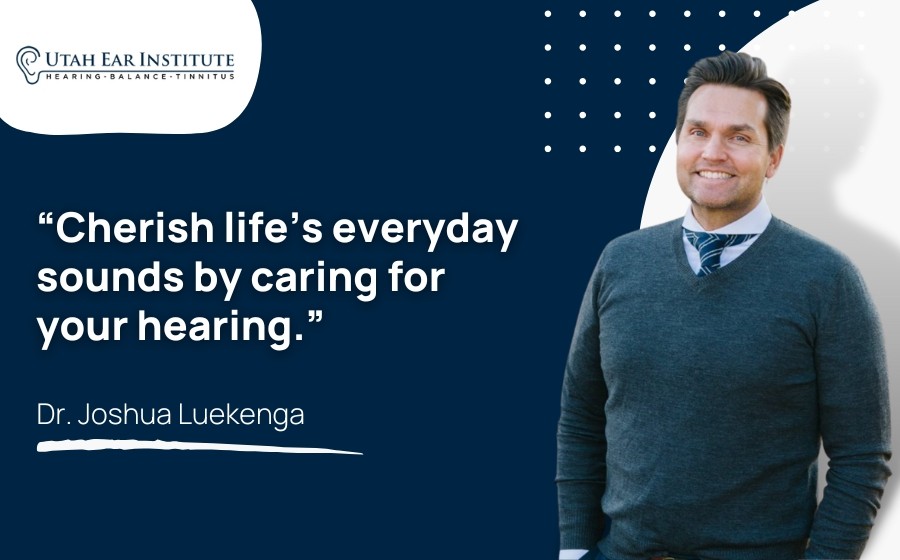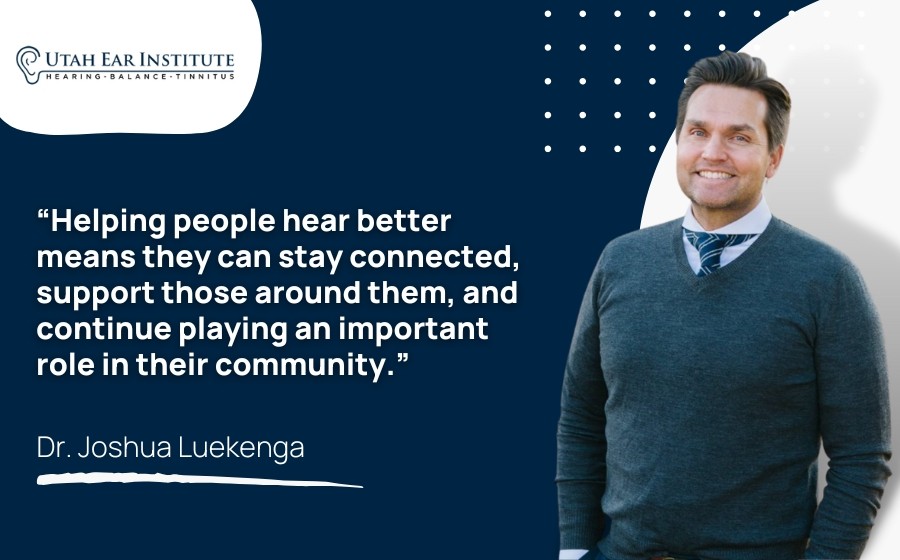Why ChatGPT Isn’t Your Audiologist (But It Can Help You Ask Better Questions)
Why ChatGPT Isn’t Your Audiologist (But It Can Help You Ask Better Questions)
Why ChatGPT Isn’t Your Audiologist (But It Can Help You Ask Better Questions)

Why ChatGPT Isn’t Your Audiologist (But It Can Help You Ask Better Questions)
06-15-18
A patient recently emailed me about a strange auditory experience, something they were concerned might be neurological. Before reaching out to me, they’d asked ChatGPT what might be going on. The answer they got was okay, but not great; it lacked nuance, accuracy, and clinical grounding. So, I replied with what I genuinely believed was happening based on what they described: a subtle but very real physiological change in how the inner ear processes complex harmonics. They appreciated the explanation and uploaded my response back into ChatGPT, and the AI produced a much better summary, now informed by my input. It was an interesting exchange, proving how far AI has come regarding helping us understand complicated concepts, especially health-related ones. But it also prompted an important reminder, one I think is worth sharing publicly: AI is a tool, not an authority. It can make complex language easier to read. It can summarize ideas. It can even help spark new ways of looking at something. But it doesn’t replace training. It doesn’t replace clinical experience. And it definitely doesn’t replace someone who’s spent years helping people with real-world problems.
Use AI With a Grain of Salt
There’s no harm in asking ChatGPT a question to do with your health, your car, or your finances. After all, that’s what it’s made for. But, and it’s a big “but,” you should always take AI answers with a grain of salt. Like any machine, AI can make things up. It can oversimplify. And even when it’s technically correct, it may miss why something matters or how it applies to your specific situation. Whether it’s for your hearing, your brakes, or your retirement account, it’s always wise to double-check AI advice with someone who’s done the work, seen the edge cases, and knows what questions to ask next.
Real-Life Hearing, Real-Life Expertise
In this case, the patient was experiencing a momentary misperception of musical pitch, likely due to aging hair cells in the inner ear failing to catch subtle harmonic details. It’s not a sign of dementia. It’s not cognitive decline. But it is a real, physical issue that can only be properly diagnosed and contextualized by someone trained to look (and listen) for it. Unfortunately, ChatGPT might be eager to diagnose you with what could be the incorrect thing. That means it’s crucial to take your concerns from your conversations with the chatbot to someone who can offer some real-life advice and expertise to alleviate them.
What This Means for You
We’re entering an era where AI is everywhere: in our phones, our cars, and now, our health. That’s exciting, of course! But it’s also risky if we let it replace human judgment instead of complementing it. At Utah Ear Institute, we’re always happy to answer patient questions, even the strange ones! Especially the strange ones. No matter your concerns, we’re here to help, every step of the way. If you do use AI to explore a question, great. But use it as a starting point, not a final answer. If you’d like some clarification about something going on with your hearing, start with a conversation with us, versus asking a chatbot. Feel free to give us a call at (801) 298-HEAR (4327). Alternatively, if you’d like to send a message, request a callback and we’ll get back to you as soon as possible (even if we aren’t as immediate as ChatGPT is, we’ll at least be right!).
Request a Callback
Search

Why ChatGPT Isn’t Your Audiologist (But It Can Help You Ask Better Questions)
06-15-18
A patient recently emailed me about a strange auditory experience, something they were concerned might be neurological. Before reaching out to me, they’d asked ChatGPT what might be going on. The answer they got was okay, but not great; it lacked nuance, accuracy, and clinical grounding. So, I replied with what I genuinely believed was happening based on what they described: a subtle but very real physiological change in how the inner ear processes complex harmonics. They appreciated the explanation and uploaded my response back into ChatGPT, and the AI produced a much better summary, now informed by my input. It was an interesting exchange, proving how far AI has come regarding helping us understand complicated concepts, especially health-related ones. But it also prompted an important reminder, one I think is worth sharing publicly: AI is a tool, not an authority. It can make complex language easier to read. It can summarize ideas. It can even help spark new ways of looking at something. But it doesn’t replace training. It doesn’t replace clinical experience. And it definitely doesn’t replace someone who’s spent years helping people with real-world problems.
Use AI With a Grain of Salt
There’s no harm in asking ChatGPT a question to do with your health, your car, or your finances. After all, that’s what it’s made for. But, and it’s a big “but,” you should always take AI answers with a grain of salt. Like any machine, AI can make things up. It can oversimplify. And even when it’s technically correct, it may miss why something matters or how it applies to your specific situation. Whether it’s for your hearing, your brakes, or your retirement account, it’s always wise to double-check AI advice with someone who’s done the work, seen the edge cases, and knows what questions to ask next.
Real-Life Hearing, Real-Life Expertise
In this case, the patient was experiencing a momentary misperception of musical pitch, likely due to aging hair cells in the inner ear failing to catch subtle harmonic details. It’s not a sign of dementia. It’s not cognitive decline. But it is a real, physical issue that can only be properly diagnosed and contextualized by someone trained to look (and listen) for it. Unfortunately, ChatGPT might be eager to diagnose you with what could be the incorrect thing. That means it’s crucial to take your concerns from your conversations with the chatbot to someone who can offer some real-life advice and expertise to alleviate them.
What This Means for You
We’re entering an era where AI is everywhere: in our phones, our cars, and now, our health. That’s exciting, of course! But it’s also risky if we let it replace human judgment instead of complementing it. At Utah Ear Institute, we’re always happy to answer patient questions, even the strange ones! Especially the strange ones. No matter your concerns, we’re here to help, every step of the way. If you do use AI to explore a question, great. But use it as a starting point, not a final answer. If you’d like some clarification about something going on with your hearing, start with a conversation with us, versus asking a chatbot. Feel free to give us a call at (801) 298-HEAR (4327). Alternatively, if you’d like to send a message, request a callback and we’ll get back to you as soon as possible (even if we aren’t as immediate as ChatGPT is, we’ll at least be right!).
Request a Callback
Search

Why ChatGPT Isn’t Your Audiologist (But It Can Help You Ask Better Questions)
06-15-18
A patient recently emailed me about a strange auditory experience, something they were concerned might be neurological. Before reaching out to me, they’d asked ChatGPT what might be going on. The answer they got was okay, but not great; it lacked nuance, accuracy, and clinical grounding. So, I replied with what I genuinely believed was happening based on what they described: a subtle but very real physiological change in how the inner ear processes complex harmonics. They appreciated the explanation and uploaded my response back into ChatGPT, and the AI produced a much better summary, now informed by my input. It was an interesting exchange, proving how far AI has come regarding helping us understand complicated concepts, especially health-related ones. But it also prompted an important reminder, one I think is worth sharing publicly: AI is a tool, not an authority. It can make complex language easier to read. It can summarize ideas. It can even help spark new ways of looking at something. But it doesn’t replace training. It doesn’t replace clinical experience. And it definitely doesn’t replace someone who’s spent years helping people with real-world problems.
Use AI With a Grain of Salt
There’s no harm in asking ChatGPT a question to do with your health, your car, or your finances. After all, that’s what it’s made for. But, and it’s a big “but,” you should always take AI answers with a grain of salt. Like any machine, AI can make things up. It can oversimplify. And even when it’s technically correct, it may miss why something matters or how it applies to your specific situation. Whether it’s for your hearing, your brakes, or your retirement account, it’s always wise to double-check AI advice with someone who’s done the work, seen the edge cases, and knows what questions to ask next.
Real-Life Hearing, Real-Life Expertise
In this case, the patient was experiencing a momentary misperception of musical pitch, likely due to aging hair cells in the inner ear failing to catch subtle harmonic details. It’s not a sign of dementia. It’s not cognitive decline. But it is a real, physical issue that can only be properly diagnosed and contextualized by someone trained to look (and listen) for it. Unfortunately, ChatGPT might be eager to diagnose you with what could be the incorrect thing. That means it’s crucial to take your concerns from your conversations with the chatbot to someone who can offer some real-life advice and expertise to alleviate them.
What This Means for You
We’re entering an era where AI is everywhere: in our phones, our cars, and now, our health. That’s exciting, of course! But it’s also risky if we let it replace human judgment instead of complementing it. At Utah Ear Institute, we’re always happy to answer patient questions, even the strange ones! Especially the strange ones. No matter your concerns, we’re here to help, every step of the way. If you do use AI to explore a question, great. But use it as a starting point, not a final answer. If you’d like some clarification about something going on with your hearing, start with a conversation with us, versus asking a chatbot. Feel free to give us a call at (801) 298-HEAR (4327). Alternatively, if you’d like to send a message, request a callback and we’ll get back to you as soon as possible (even if we aren’t as immediate as ChatGPT is, we’ll at least be right!).
Request a Callback
Search
Ask Dr. Josh
Our latest hearing health articles, resources & blogs

How Hearing Aids Helped Improve Communication and Brain Health: Glen’s Story
Early hearing support can protect your brain and improve daily conversations.

How Modern Hearing Aids Helped Protect the Sounds Judith Loves
Protect your hearing and enjoy the sounds you love every day.

Hear for the Holidays 2025 – Meet This Year’s Winner!
Meet Todd, our 2025 Hear for the Holidays winner.
Ask Dr. Josh
Our latest hearing health articles, resources & blogs

How Hearing Aids Helped Improve Communication and Brain Health: Glen’s Story
Early hearing support can protect your brain and improve daily conversations.

How Modern Hearing Aids Helped Protect the Sounds Judith Loves
Protect your hearing and enjoy the sounds you love every day.

Hear for the Holidays 2025 – Meet This Year’s Winner!
Meet Todd, our 2025 Hear for the Holidays winner.
Ask Dr. Josh
Our latest hearing health articles, resources & blogs

How Hearing Aids Helped Improve Communication and Brain Health: Glen’s Story
Early hearing support can protect your brain and improve daily conversations.

How Modern Hearing Aids Helped Protect the Sounds Judith Loves
Protect your hearing and enjoy the sounds you love every day.

Hear for the Holidays 2025 – Meet This Year’s Winner!
Meet Todd, our 2025 Hear for the Holidays winner.